|
|
|
Sort Order |
|
|
|
Items / Page
|
|
|
|
|
|
|
| Srl | Item |
| 1 |
ID:
164373
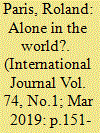

|
|
|
|
|
| Summary/Abstract |
Canada has found itself in serious diplomatic disputes over the past year with Saudi Arabia and China. The Saudis took issue with the Canadian foreign minister’s call to release human rights activists from prison, whereas China was angry at Canada’s arrest of a senior Chinese executive on an extradition request from the United States. These incidents should not be viewed as isolated aberrations. Authoritarian regimes seem increasingly emboldened to lash out at countries that displease them, including allies of the United States. But Ottawa has succeeded in rallying considerable international support for its position in the China dispute, suggesting that while Canada may be exposed, it is not destined to be alone
|
|
|
|
|
|
|
|
|
|
|
|
|
|
|
|
| 2 |
ID:
164366
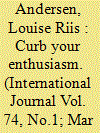

|
|
|
|
|
| Summary/Abstract |
The future looks post-Western. But will it also be post-liberal? To gauge how and by whom liberal internationalism may be sustained in the coming order, the article provides a critical and historically grounded analysis of the role of the United Nations in the fading US-led order and the ordering potential and role of middle powers. The article suggests that in the current interregnum of global governance the conventional distinction between traditional and emerging middle powers is increasingly unhelpful. What matters is not their past history, but their present proclivity for seeking multilateral, negotiated solutions. It is this pragmatic version of liberal internationalism that may have a future in a post-Western world, and open up a more pluralist, inclusive approach to global governance.
|
|
|
|
|
|
|
|
|
|
|
|
|
|
|
|
| 3 |
ID:
164367
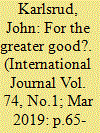

|
|
|
|
|
| Summary/Abstract |
The usual suspects of middle power internationalism—small and middle powers such as Canada, Denmark, Norway, the Netherlands, and Sweden—have all contributed to the UN peacekeeping mission in Mali (MINUSMA). This article argues that while these and other Western countries' contributions to MINUSMA may still be characterized as investments into UN peacekeeping reform and a rule-governed world order, the liberal underpinnings of that commitment are withering. Instead, these countries seek to enhance their own status. This is done by gaining appreciation for their contributions, primarily from the US; strengthening their bids for a non-permanent seat on the UN Security Council; and self-interested contributions to reform UN peacekeeping by efforts to enable it to confront violent extremism and terrorism. Paradoxically, the article concludes, when moving the UN towards counterterrorism and weakening the legitimacy of the organization, Western states undermine a cornerstone of their own security.
|
|
|
|
|
|
|
|
|
|
|
|
|
|
|
|
| 4 |
ID:
164368
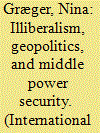

|
|
|
|
|
| Summary/Abstract |
Middle powers have played a key role in supporting global governance, a rules-based order, and human rights norms. Apart from conveying and effectuating global solidarity and responsibility, multilateral cooperation has been an arena where middle powers seek protection and leverage relatively modest power to greater effect, sometimes as “helpful fixers” to great powers. This article argues that geopolitical revival and the contestation of the liberal order are challenging middle powers' traditional sheltering policies, based on empirical evidence from the Norwegian case. First, the weakening of multilateral organizations is making middle powers more vulnerable to great power rivalry and geopolitics, and Norway's relationship with Russia is particularly pointed. Second, existing shelters such as NATO and bilateral cooperation with the US are negatively affected by the latter's anti-liberal foreign policies, making looser sheltering frameworks important supplements. While Norway's and other middle powers' traditional policies within the “soft power” belt may continue, “doing good” may become less prioritized, due to the need for security.
|
|
|
|
|
|
|
|
|
|
|
|
|
|
|
|
| 5 |
ID:
164363
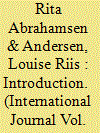

|
|
|
|
|
| Summary/Abstract |
At a time when liberal internationalism and institutions of multilateral cooperation are being dealt almost daily blows, this special issue revisits the notion and practice of middle power liberal internationalism. The introduction suggests that while liberal internationalism is far from dead, the challenges are serious and multiple. Reflecting on the seven essays contained in the volume, it argues that the biggest challenge for a future liberal internationalism is not to double-down on its normative virtues, but critically to reflect on how it can be retooled to respond to new challenges.
|
|
|
|
|
|
|
|
|
|
|
|
|
|
|
|
| 6 |
ID:
164370
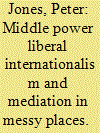

|
|
|
|
|
| Summary/Abstract |
Canada seeks to increase its role in mediation as part of a renewed liberal internationalist foreign policy. This means confronting the question of how to manage the domestic political consequences of engaging as a mediator with those violating cherished international norms, while also upholding the view that they should be punished. Key to all this is the concept of impartiality, particularly as it relates to the objectives of liberal internationalist countries. This paper explores multiple meanings of the term “impartial” as they pertain to mediation, particularly with respect to the question of mediations involving those who have violated international norms. The paper then explores whether increased support for “arms length” mediations, such as Track Two diplomacy, might allow for more involvement in mediation, while avoiding direct involvement in morally fraught situations. The paper concludes that Track Two can be useful in developing a national capacity for international mediation, and that work can also be done to make Track Two—which is currently based largely on Western concepts—more indigenous. However, support for Track Two does not answer the fundamental question of how Canada, as such, can be more active as a mediator if it is not willing to engage with actors who have committed atrocities.
|
|
|
|
|
|
|
|
|
|
|
|
|
|
|
|
| 7 |
ID:
164365
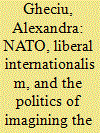

|
|
|
|
|
| Summary/Abstract |
International Relations scholars often assume that NATO represents the institutional expression of a pre-existing, liberal-democratic Western security community. However, far from simply representing a pre-given community, NATO has always been involved in power-filled processes of constructing “the West.” At the heart of those processes lie practices of collective (re)imagining of the Western world, as well as the representation of internal tensions as feuds within a community united by liberal values. Today, the task of managing internal differences has become particularly complicated due to the rise of radical conservative political forces in several allied states. This has translated into an unprecedented clash between liberal and illiberal interpretations of the Western community. This paper also shows that, contrary to conventional wisdom, middle powers have played important roles both in the construction of the liberal Western security community, and, more recently, in articulating an alternative—radical conservative—vision of the West.
|
|
|
|
|
|
|
|
|
|
|
|
|
|
|
|
| 8 |
ID:
164369


|
|
|
|
|
| Summary/Abstract |
Many argue that if liberal internationalism is in retreat, global support for human rights will weaken. This pessimistic outlook for human rights is not fully supported by the facts, not least that global attention to human rights continues to strengthen even as Western power declines. Emerging powers will certainly shape the human rights debate, and the authoritarians among them pose real risks, but global concern for human rights has never been solely dependent on Western support. The challenge for middle powers is not one of retrenchment around the status quo, but rather to build new coalitions of concerned states to meet new human rights challenges.
|
|
|
|
|
|
|
|
|
|
|
|
|
|
|
|
| 9 |
ID:
164375
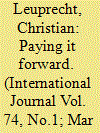

|
|
|
|
|
| Summary/Abstract |
Although the dissolution of the Soviet Union may have altered the founding Cold War rationale for NATO, the fundamental principle of the transatlantic alliance has prevailed for 70 years: the collective defence of shared interests. In the face of Russian aggression, and uncertainty about US continued commitment to the alliance, reinforcing NATO has emerged as Canada's top expeditionary defence priority. Indeed, just before the NATO summit in July 2018, Prime Minister Justin Trudeau renewed Canada's commitment to the enhanced Forward Presence (eFP) as the Framework Nation for Latvia for four years, and scaled up Canada's contribution to the allied battlegroup. This decision is as much a reflection of the eFP's immediate collective defence requirements in Latvia as it is of the extent to which the existential fate of Canada's most important defence asset hangs in the balance: the alliance, Canada's role in it, and the future of Canadian defence policy.
|
|
|
|
|
|
|
|
|
|
|
|
|
|
|
|
| 10 |
ID:
164372


|
|
|
|
|
| Summary/Abstract |
Canadian international history is currently enjoying an Asian moment. A handful of younger scholars have cast their attention eastward, generating exciting new work on Canadian relations with specific countries and regions across the Pacific region. This article draws on some of their work, as well as the author’s own long-standing research on Canada’s Department of External Affairs, to weigh the Pacific’s changing importance to Canada. The article argues that the domestic and foreign policies of Prime Minister Pierre Trudeau, elected in 1968, were truly transformational. Trudeau swept away the traditional hesitations and confining North Atlanticism that characterized the diplomacy of his postwar predecessors. Instead, he pursued a full-throttled policy of strategic engagement that repositioned Asia front and centre of contemporary Canadian foreign policy.
|
|
|
|
|
|
|
|
|
|
|
|
|
|
|
|
| 11 |
ID:
164364


|
|
|
|
|
| Summary/Abstract |
Challenges to the liberal international order have tended to focus on the politics of populism most often traced to reactions against economic dislocation and mass migration. Parts of this portrait are undoubtedly true, but it also risks being deeply misleading. To fully understand the nature and depth of contemporary far-right movements, we need to examine more closely the distinctive ideological movements that inform and animate them. This article explores one specific articulation of these movements: US paleoconservatism. Although relatively unknown in the mainstream media, this anti-establishment strain of radical conservatism has provided intellectual ammunition to a wide range of agents and ideological forces challenging the prevailing liberal order nationally and internationally, including important parts of the anti-liberal politics of foreign policy under President Donald Trump.
|
|
|
|
|
|
|
|
|
|
|
|
|
|
|
|
|
|
|
|
|